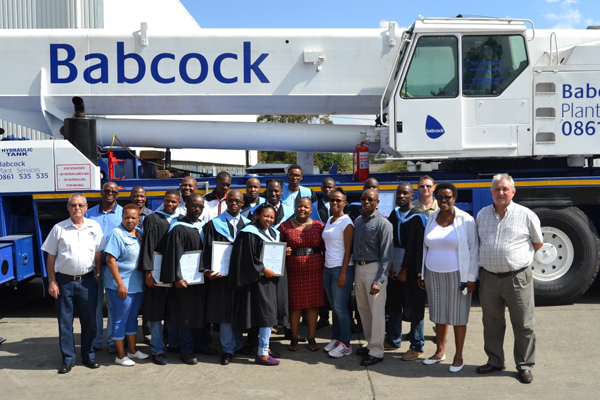Babcock is a leading supplier of mobile cranes and construction gear for rental, as well as lifting equipent and services throughout Southern Africa. With our comprehensive offering of welding, construction and rigging equipment and the extensive range of our crane fleet, we understand the need for stringent safety requirements. We are committed to delivering high-quality equipment but also to providing competent and motivated crane operators. Mobile Crane Operator Training
Mobile Crane Operator Training
The crane industry is more technical than many believe. In fact, this particular industry has a history marred with serious accidents due to a lack of technical expertise and training. Many operators receive only two days of training, leaving them ill-equipped to safely handle the machinery. According to Occupational Care South Africa (OCSA), only 10 percent of incidents are due to unsafe working environments and 88 percent of them are attributed to employee’s actions or lack of expertise in how to manage a precarious situation. OCSA is a leader in workplace health and wellness and this organisation pays close attention to inherently dangerous workplaces. The construction industry is said to rank in the top tier of “dangerous workplaces”.
How did we ensure we delivered not only the best quality equipment but also the most qualified operators?
The majority of crane accidents are due to operator error. Operators need to be trained to understand the risks and consequences associated with working these heavy lifting machines. In order to mitigate safety risks, operators certainly need more than two days worth of training. For Babcock to be able to offer a training course that would extensively develop the skill set of our operators we partnered with Dees Training, a black female owned and operated business. This joint venture with Dees Training is testament to Babcock’s commitment to enterprise development.
Babcock together with Dees Training structured a suitable training programme for mobile crane operators. The core and fundamental training which includes courses in mathematics, English and safety are provided by Dees Training and Babcock provides the students with the necessary practical studies. Babcock and Dees Training work within the realm of the Transport Education and Training Authority (TETA). The Contractors Plant Hire Association (CPHA) also got involved in the training programme so as to formalise a safety qualification for mobile crane operators.
Our training centre opened in November 2014 and together with Dees Training and the CPHA, we trained and certified the first mobile crane operators in South Africa.
Since then we’ve focused on ensuring all our mobile crane operators are qualified to this level of skill and understanding. In 2017, Babcock’s training school was registered with the Department of Higher Education & Training (DHET) and is now an accredited training provider.
This Women's Month we tip our hats to the tenacious women we’ve trained
Of the first 10 learners who graduated in 2015, one of them was a black woman crane operator. Since then, we’ve seen many learners of both genders successfully graduate through our programme and confidently enter the industry.
The heavy machinery industries are historically gender specific. No women were found on construction sites as only men were considered strong enough to handle the work required. Also, the dangerous nature of this work meant men were targeted as more suitable to the environment. But with many major technological advancements in the various industries and in the training programmes, the workload and the equipment don’t require brute strength anymore. What is required, though, is the mental strength for unwavering focus, steely nerves, the ability to efficiently take instruction and excellent communications skills. And, so, the mobile crane industry has seen an increase in women operators. Celebrating women in the industry, we would like to share the story of Khutso Maimela: Babcock lifting machine operator.
We are continually trying our best to encourage as many women as we can to enter this field. Currently we have 22 learners progressing through our training centre, 10 of these are female. This inarguably proves that with the right qualifications in place, the technical know-how and practice hours under the belt, women and men alike can forge a successful career in mobile crane operations.

